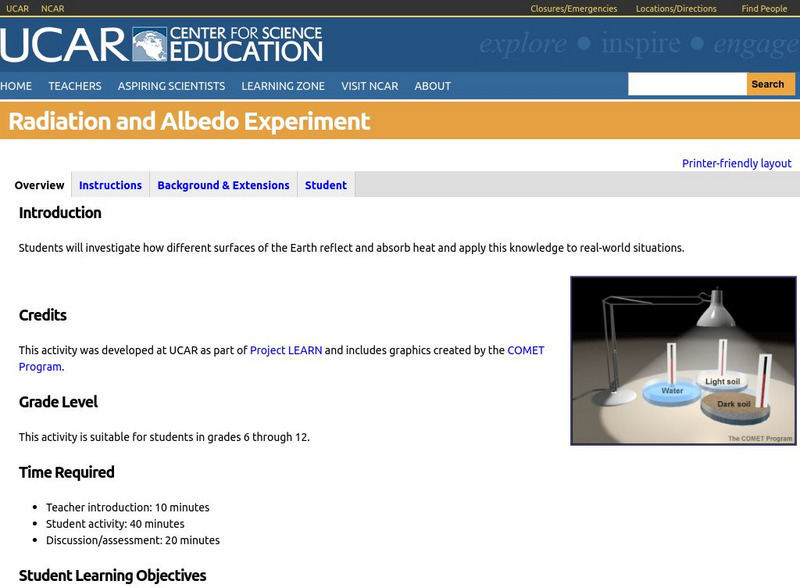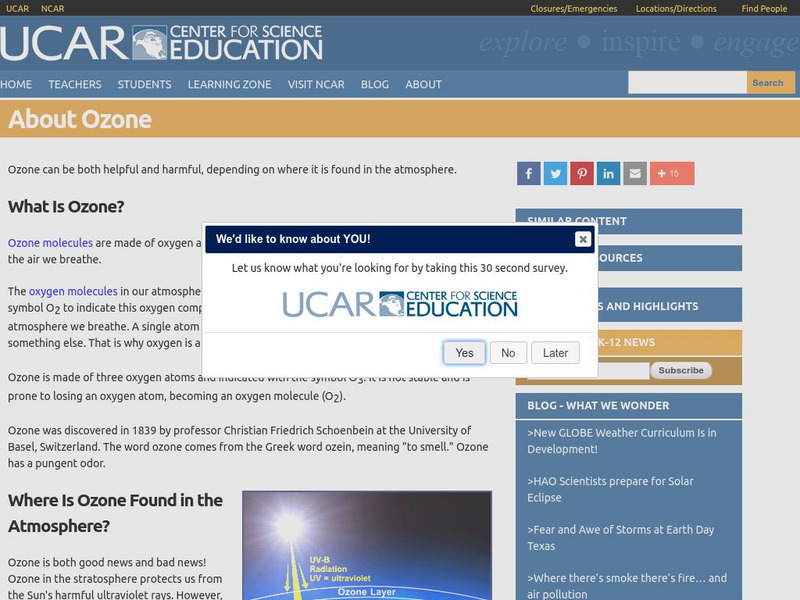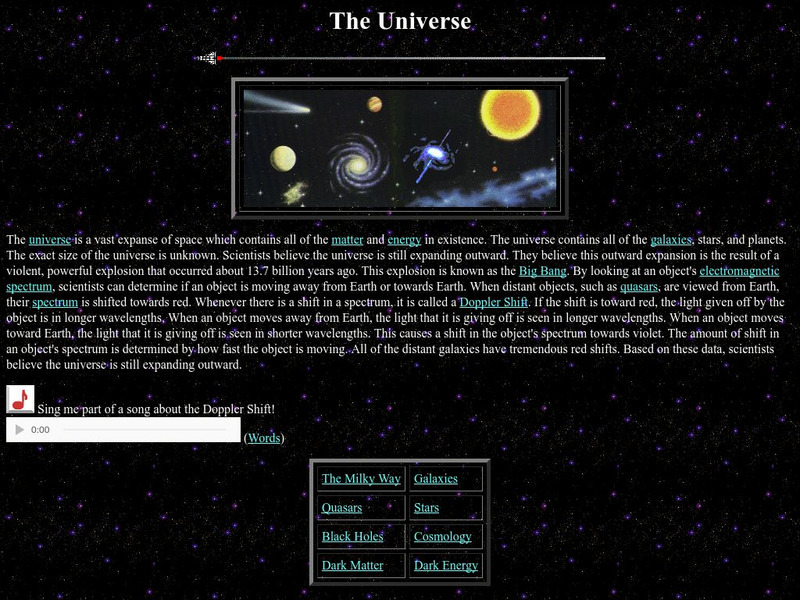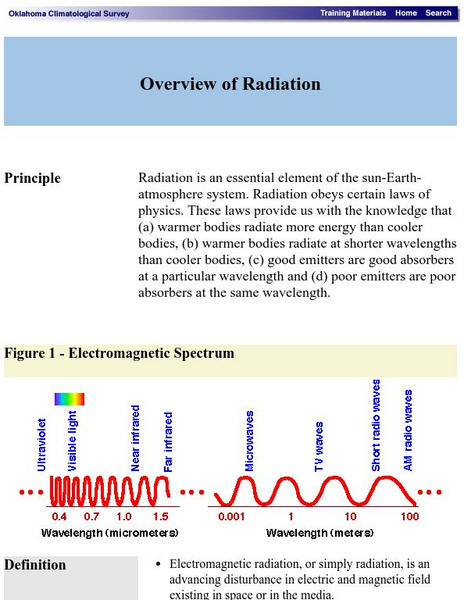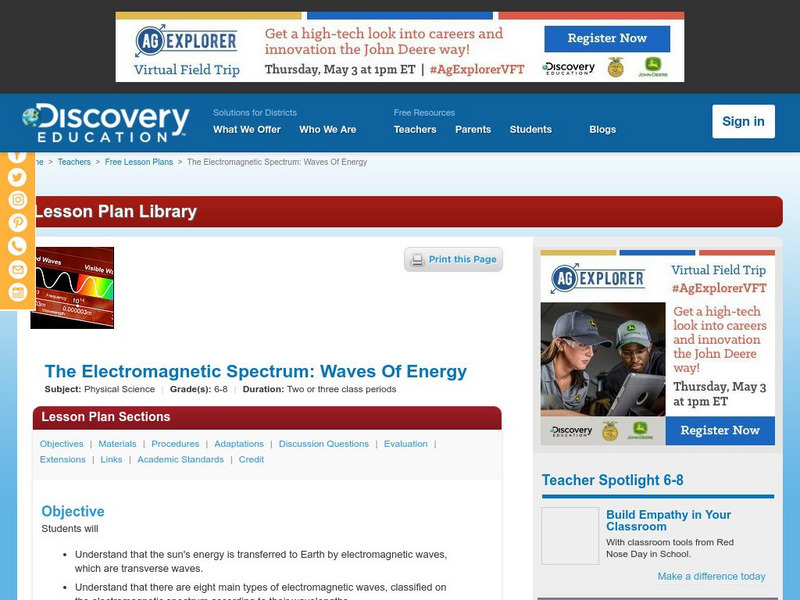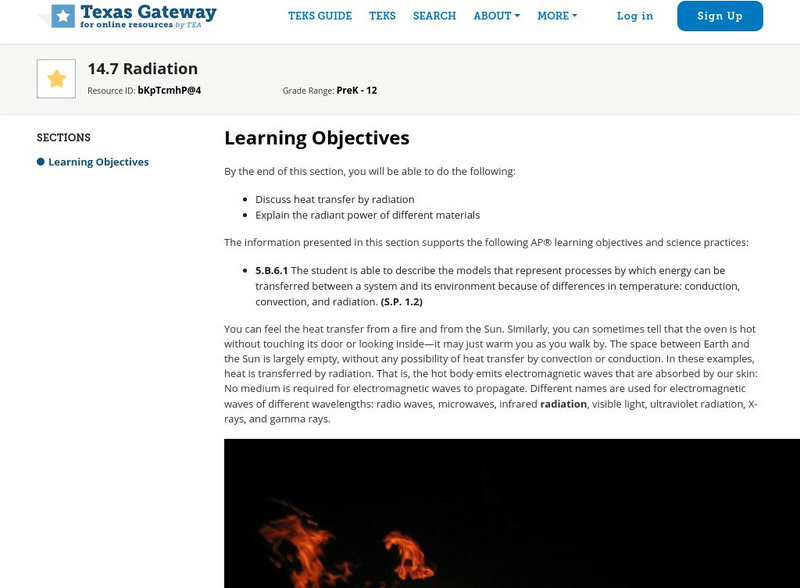My Science Site
Optics: Energy and Control [Pdf]
A very comprehensive unit including topics such as light and its source, visible sources of light, transparency of objects and much more. Also offers a resource list, blackline masters, and expectation list, expectation summary and a...
University Corporation for Atmospheric Research
Ucar: Atmospheric Processes Radiation
This site provides background information, images, and an activity to help students understand the concept of radiation. Includes both the student pages and a teachers guide with lesson plan.
TeachEngineering
Teach Engineering: Visible Light and the Electromagnetic Spectrum
In this instructional activity, the electromagnetic spectrum is explained and students learn that visible light makes up only a portion of this wide spectrum. Students also learn that engineers use electromagnetic waves for many...
NASA
Nasa: Space Place: What Is Infrared?
See images and read about examples of infrared rays, and learn how they behave in different conditions.
Read Works
Read Works: Electromagnetic Radiation
[Free Registration/Login Required] An informational text about electromagnetic radiation and the effects it creates. A question sheet is available to help students build skills in reading comprehension.
CK-12 Foundation
Ck 12: Earth Science: Telescopes
[Free Registration/Login may be required to access all resource tools.] Overview of the electromagnetic spectrum and types of telescopes.
CK-12 Foundation
Ck 12: Physical Science: Electromagnetic Spectrum
[Free Registration/Login may be required to access all resource tools.] Covers electromagnetic radiation and its properties, and the electromagnetic spectrum.
NASA
Nasa: Mission: Science: Electromagnetic Spectrum: Infrared Waves
Infrared light lies between the visible and microwave portions of the electromagnetic spectrum. Infrared light has a range of wavelengths, just like visible light has wavelengths that range from red light to violet.
University Corporation for Atmospheric Research
Ucar: About Ozone
A detailed overview of the chemistry of ozone and its role in the atmosphere. Students learn about the benefits and hazards of ozone. All information is reinforced through pictures, graphs, and learning activities. Learning activities...
NASA
Nasa Star Child: The Universe (Level 2)
This site provides a description of the universe and what it contains. Includes links to definitions, activities, and an audio song. Printable version available.
NASA
Nasa: The Space Place: The Land of the Magic Windows
This is a site from NASA that contains an interesting and fun way to learn about the electromagnetic spectrum. Kate receives a strange riddle from her grandfather. Find out what it says and go through the gateway to the Land of the Magic...
Physics Classroom
The Physics Classroom: The Electromagnetic and Visible Spectra
A tutorial on the electromagnetic and visible spectra. Discusses dispersion and how perceptions of white and black are related to the visible light spectrum.
NASA
Nasa: Electromagnetic Spectrum: Radio Waves
Radio waves have the longest wavelengths in the electromagnetic spectrum. This NASA article discusses AM, FM, TV, cell phone, as well as radio astronomy, which all use this technology.
Georgia State University
Georgia State University: Hyper Physics: Photoelectric Effect
Using graphics, words and numbers, the photoelectric effect is described and explained. Planck's theory about quanta of light is explained. Photon energies for the various regions of the EM spectrum are listed. An interactive JavaScript...
Oklahoma Mesonet
Oklahoma Climatological Survey: Overview of Radiation
This site details what radiation is, the physics of radiation, and radiative transfer as it occurs in nature. Content explores the electromagnetic spectrum, electromagnetic waves, properties of radiation, and solar radiation.
CK-12 Foundation
Ck 12: Earth Science: Solar Energy on Earth
[Free Registration/Login may be required to access all resource tools.] Describes characteristics of solar energy including the electromagnetic spectrum and movement.
Johns Hopkins University
The Electromagnetic Spectrum
NASA related site shows the entire Electromagnetic Spectrum. Provides a brief description of the expansive colored spectrum as well as a related link that provides more details.
Physics Classroom
The Physics Classroom: Light Waves/color: Electromagnetic and Visible Spectra
This illustrated physics tutorial explains the electromagnetic and visible spectra of light using illustrated examples and interactive practice problems.
Science Struck
Science Struck: Electromagnetic Waves: Origin and Theory
Discusses the history of the discovery and study of electromagnetism, the scientists who worked on it, the basic principle, how wavelength and frequency are related, and types of electromagnetic waves.
Science Struck
Science Struck: A Simple Explanation of How Electromagnets Work
Gives a brief history of electromagnets and describes the parts of an electromagnet and how one works. Includes labeled illustrations and examples of their many applications.
Physics Aviary
Physics Aviary: Em Spectrum Lab
This lab is designed to allow students to look at the factors affecting the location of different colors formed by diffraction grating.
Science Struck
Science Struck: Working of an Infrared Thermometer
Learn how an infrared thermometer works and what each of its parts does. A chart lists the different applications of infrared thermometers by the wavelength each emits.
Discovery Education
Discovery Education: The Em Spectrum: Waves of Energy
Students are introduced to the electromagnetic spectrum through this group research activity. Each group investigates a different wavelength range within the em spectrum and reports back to class. Discussion ideas also included.
Texas Education Agency
Texas Gateway: Heat and Heat Transfer Methods: Radiation
By the end of this section, you will be able to discuss heat transfer by radiation and explain the radiant power of different materials.


![Optics: Energy and Control [Pdf] Lesson Plan Optics: Energy and Control [Pdf] Lesson Plan](https://d15y2dacu3jp90.cloudfront.net/images/attachment_defaults/resource/large/FPO-knovation.png)
